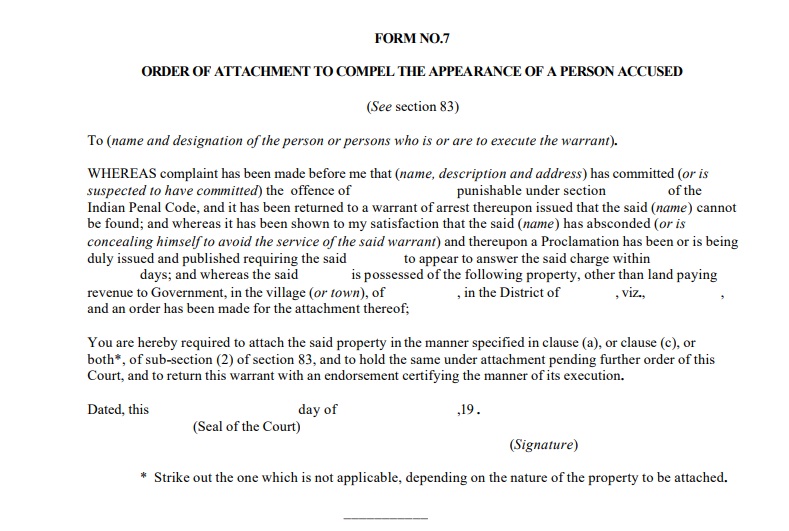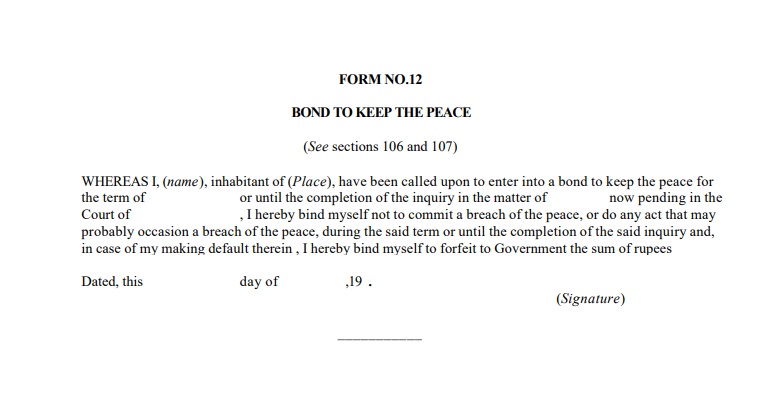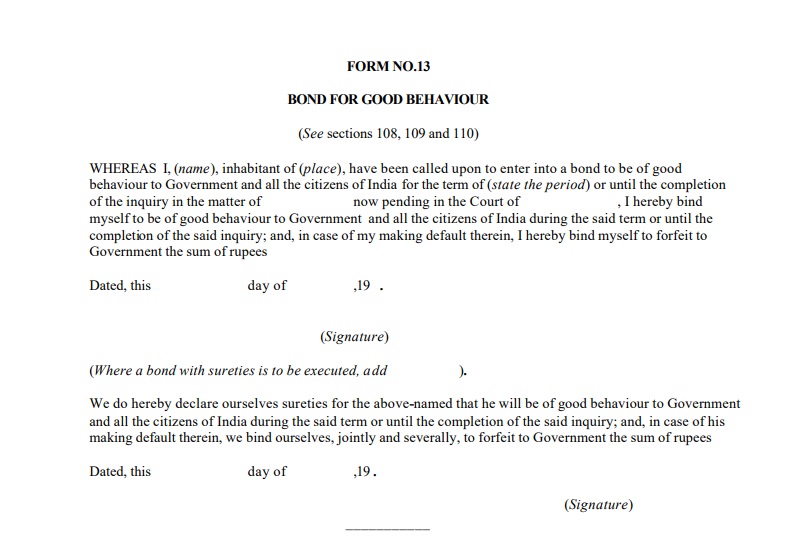 Updated on: December 8th, 2018 5:24 AM
Updated on: December 8th, 2018 5:24 AM
Summons and Warrants
A summons is an officially issued document that is released by any Court on an individual or an entity who may be involved in a legal proceeding. A summon is usually served when legal action is taken against an individual, or a person is required to appear before a court as a witness in a proceeding. This document ensures that the person is called upon and his presence on the given date of the hearing. On the other hand, a warrant is issued to apprehend an individual committing a particular offence(s). In this article, we study the aspects of the same mention in The Criminal Procedure Code: Summons and Warrants.Summons
A summon is a document issued either for the appearance or for producing a document or an item which may be issued to an accused person or witness. Section 61 of the Criminal Procedure Court states that every summons issued by the Court shall be in writing, in duplicate along with the signature of the Presiding Officer of such Court or by such an officer as is authorised by the High Court and shall bear the seal of the High Court. The summons should be specific and clear in its terms regarding information such as the title of the Court, the place at which, the day and time of the day when the attendance of the person summoned are required. Form to Summon an Accused- CRPC
Form to Summon an Accused- CRPC
Section 62 & Section 65: Service of Summons
As per Section 62 of the Criminal Procedure Code, the summons shall be served by a police officer or an officer of the Court or any other public servant. In case the service cannot be bought into effect by the exercise of due diligence, the serving officer can perform a substituted service by affixing one of the duplicates of the summons to some conspicuous part of the residence of the summoned individual, and thereupon the Court, after making such enquiries as it seems fit may either declare that the summons has been duly served or issue a fresh service, as it considers proper as stated in Section 65 of the Code. Summons- CRPC
Summons- CRPC
Section 63 to Section 66: Summons on Corporate Bodies, and Societies
The service of a summon on a corporation may in effect by serving it on specific individuals who are a part of the corporation. This includes the secretary, the local manager or any other principal officer of the corporation. A summon may be in the form of a letter sent by registered post and addressed to the respective Chief Officer of the Corporation in the country. In this case, the service of a summon shall be deemed to be in effect when the letter arrives in the ordinary course of the postal service. Generally, the meaning of the word 'corporate' in this Section of the Criminal Procedure Code means an incorporated company or any other corporate body. This also includes a society that is registered under the Societies Registration Act of 1860. Therefore, societies may not be a body that is formally incorporated although, in Section 63, it is mentioned that societies fall within the scope of this law. When a postal service is used to deliver summons, it may fail to affect the service of summons as stated in Section 62. However, Section 64 provides the extended service that can be secured by leaving a copy or a duplicate of the summon with an adult male member of the person's family who resides in the same residence. It should be ensured that the receiver is asked to sign the receipt for receiving the summon. Section 64 mentions that non-family members(such as a servant) are not to accept a summon. When a Government Servant is to be summoned, the duplicate copy of the order/ summon shall be sent to the Head of the Department in the office of the employee by the Court. According to Section 62, the Head is required to serve the summons in the manner provided in the Section and ensure to return the same to the Court with his signature with the endorsement. The signature of the Head shall be used as evidence of due service as stated in Section 66.Section 91: Summons to produce
Section 91 and Section 92 of the Criminal Procedure Code talks about the summons to produce. In some cases, a Court or an officer of the law considers that the production of a document or any other item is essential for a proceeding such as an investigation, inquiry or a trial. Under this Section, a Court or an Officer may issue a summons in a written manner to an individual who the document or item is believed to be in possession. This compels the individual to attend and produce the object at the time and place stated in the order.Warrant of Arrest
Section 70 of the Criminal Procedure Code states the aspects of a warrant of an arrest. Every warrant of arrest that is issued by a Court under this Section has to be in writing and signed by the presiding officer of the respective Court. The warrant should also bear the seal of the same Court that issued the warrant. A warrant of an arrest shall remain in force unless it is cancelled by the respective Court that published it in the first place, or until it is executed. Form No. 2 of the Second Schedule shows the form of a warrant of arrest. The following are the requirements that are to checked off to issue a legal order of arrest.- The warrant of arrest must be in writing.
- The warrant must state the name and the designation of the individual who is to execute the order.
- The warrant must give the full name and the description of the person who is to be arrested.
- The warrant must state the offence charged on the individual.
- The presiding officer must sign the warrant of arrest.
- The warrant of arrest must be sealed.
 Arrest Warrant Format- CRPC
Arrest Warrant Format- CRPC
Section 82 & Section 83: Proclamation and Attachment
The Criminal Procedure Code offers two remedies when a warrant remains unexecuted. They are as follows:- Section 82: Issuing a Proclamation
- Section 83: Attachment and sale of property
 Proclamation and Attachment Format- CRPC
Section 82 states the necessary actions that may be taken if a Court has enough valid reasons to believe that an individual, against whom a warrant of arrest has been issued, has absconded or is concealing himself with the purpose to avoid the execution of the warrant. The Court may release a written proclamation requiring the individual to appear at a place and time that is specified in the order which would usually not be less than 30 days from the date of publishing the proclamation.
Proclamation and Attachment Format- CRPC
Section 82 states the necessary actions that may be taken if a Court has enough valid reasons to believe that an individual, against whom a warrant of arrest has been issued, has absconded or is concealing himself with the purpose to avoid the execution of the warrant. The Court may release a written proclamation requiring the individual to appear at a place and time that is specified in the order which would usually not be less than 30 days from the date of publishing the proclamation.
 Proclamation and Attachment Format 2- CRPC
The Magistrate must record the valid evidence that indicates that the accused has absconded or has concealed himself while issuing a proclamation. The purpose of attaching property is not to punish the accused, but to compel the individual to appear to execute the order.
Proclamation and Attachment Format 2- CRPC
The Magistrate must record the valid evidence that indicates that the accused has absconded or has concealed himself while issuing a proclamation. The purpose of attaching property is not to punish the accused, but to compel the individual to appear to execute the order.
Section 93 to Section 97: Search Warrant
A search warrant can be issued in any of the following situations according to Section 93.- In a case where a Court has a reason to believe that an individual summoned to produce any item or document is unwilling to deliver it.
- In a case where a document or an item is unknown to the Court to be in possession of an individual.
- In a case where a general inspection or a search is required to be conducted. However, a search warrant may be in general or in restriction as it's as to any place or a part thereof.
 Search Warrant- CRPC
According to the context of Section 97 of the Criminal Procedure Code, any District Magistrate, Sub-Divisional Magistrate or Magistrate of the First Class who may have reasons to believe that any individual, who is confined under such situations that the confinement turns to be an offence, may issue a warrant to search for the person that may be restricted. If the person is found, he shall be immediately produced before the Magistrate for further purposes.
Search Warrant- CRPC
According to the context of Section 97 of the Criminal Procedure Code, any District Magistrate, Sub-Divisional Magistrate or Magistrate of the First Class who may have reasons to believe that any individual, who is confined under such situations that the confinement turns to be an offence, may issue a warrant to search for the person that may be restricted. If the person is found, he shall be immediately produced before the Magistrate for further purposes.
Section 106: Security for the keeping of peace on conviction
When a Court of Session or a Court of a Magistrate of the First Class finds a person guilty of any of the offences specified in Sub-section (2) or of abetting any of the mentioned offences and has an opinion that it is necessary to take a form of security from such an individual for keeping the peace, the Court may, at the time of declaring a sentence on such a person, order him to execute a bond, with or without sureties, for keeping the period with peace that does not exceed three years, as it thinks fit. The offences mentioned under Sub-section (2) are as follows.- An offence that is punishable under Chapter VIII of the Indian Penal Code 1860.
- An offence which comprises of or includes assault or the use of criminal force or committing mischief.
- An offence with a nature of criminal intimidation.
- An offence which causes or was intended to likely to cause a breach of the peace.
 Bond to Keep Peace- CRPC
Bond to Keep Peace- CRPC
Section 107: Security for keeping peace in other cases
An Executive Magistrate may require an individual to show cause as to why he should not be ordered to issue a bond for keeping the peace for a period that does not exceed one year as the Magistrate deems fit. This happens when the Executive Magistrate receives information that the individual is likely to commit one of the following.- Commit a breach of peace.
- Disturb the tranquillity of the public.
- Do anything wrongful that may probably cause a breach of the peace.
 Bond of Good Behaviour- CRPC
Bond of Good Behaviour- CRPC
Popular Post

In the digital age, the convenience of accessing important documents online has become a necessity...

The Atalji Janasnehi Kendra Project that has been launched by the Government of Karnataka...

The Indian Divorce Act governs divorce among the Christian couples in India. Divorce...

When an individual has more than a single PAN card, it may lead to that person being heavily penalised, or worse,...

Employees Provident Fund (PF) is social security and savings scheme for employee in India. Employers engaged...


